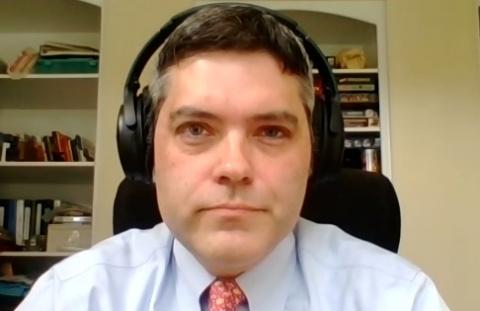
DURHAM, N.C. -- Pfizer’s COVID-19 vaccine was granted an emergency use authorization for 12- to 15-year-olds by the U.S. Food & Drug Administration on Monday.
Dr. Michael Smith, a Duke University pediatrician and infectious disease specialist involved in the pediatric trials of the Pfizer COVID-19 vaccine, discussed vaccination of adolescents during a video conference call for the media on Tuesday.
Watch the briefing on YouTube.
Quotes:
Difference between vaccines for adults and children
“For many pharmaceutical agents – antibiotics and vaccines – children get the same dose as adults do. In fact, for the Pfizer vaccine that now has FDA emergency use authorization down to 12 (years old), the 12- to 15-year-olds did in fact receive the same dose as adults received – as I received as a physician,” says Dr. Michael Smith, a Duke University pediatrician and infectious disease specialist involved in the pediatric trials of the Pfizer COVID-19 vaccine.
“However, once we get younger than that, we have to slow things down a little bit and make sure we have the right dose that is safe for younger children and effective for younger children. So, what we are doing right now at Duke is a smaller trial in children less than 12 (years old) to make sure we find that right dose. And once we have the right dose, we will be working on the next Pfizer trial, which is a large randomized controlled trial including kids really down to 6 months.”
Details of Pfizer trials for 12- to 15-year-olds
“There are almost 2,300 children, and it’s about a 50-50 split in the trial. Half of those children received a placebo, or kind of a dummy injection of saline or saltwater, and the other 50 percent received the vaccine. So that’s about just over 1,000 in each group. Of those, we enrolled just over 100 here at Duke.”
Efficacy and safety of the Pfizer vaccine for adolescents
“It’s certainly effective.”
“When you look at their (Pfizer’s) press release, the important thing to note is that of the children in the trial who ultimately had a COVID infection, all of them were in the placebo group, and none were in the vaccine group. So if you got the vaccine in this trial, you did not get COVID. That translates to a vaccine that has 100 percent efficacy.”
“Given that we’re still in a pandemic, my recommendation would be that if you have a child who’s 12 or above, I would go ahead and give them the vaccine because it’s going to prevent them from getting the disease.”
“In the context of the vaccine trial, the most common things that we are seeing were not surprising to anybody – it hurts; it can be a little bit red; your injection site can be a little bit swollen. And they (Pfizer) reported that the rates of adverse events were not different in the 12- to 15-year-old group as compared to the 16- to 25-year old group.”
“I suspect there are going to be people who get this vaccine and get COVID. Just as we saw in the adult population, even if the vaccine does not prevent you from getting COVID, it’s very, very effective at reducing severe disease and reducing hospitalization. So, I have no doubt in my mind that this is a good idea, if you have a 12- to 15-year-old at home, to give them the vaccine.”
“As a father and a pediatrician, I am thrilled that COVID does not tend to cause severe disease in children as it does in adults. But let’s be clear, kids are affected by this. Certainly, some children do get admitted to the hospital. Certainly, some children do die from this. So the risk is not zero. And I think all of us – whether we are parents or grandparents or physicians – can clearly see the impact that this pandemic has had on kids. And anything we can do to reduce disease incidence and disease transmission in kids, to get society back open to the way it was pre-pandemic, I think is useful.”
When adolescents will receive vaccinations
“I think we will be shortly having this vaccine entering into clinical practice.”
“The FDA has allowed this vaccine to be used in children from 12- to 15-(years old). The next step is for the CDC to formally recommend it.”
“It’s quite possible that children can receive this vaccine as early as Thursday.”
Meet the expert:
Dr. Michael Smith
Dr. Michael Smith is a pediatrician and medical director of the Duke Children's Health Center Infectious Diseases Clinic. He studies antibiotic and vaccine use in children and is a study investigator involved in the pediatric trials of the Pfizer COVID-19 vaccine.
---
Duke experts on a variety of other topics related the coronavirus pandemic can be found here.
This article originally appeared on Duke Today.
Related content
Leading Duke pediatrician: I would definitely vaccinate my children against COVID
The Progressive Pulse/NC Policy Watch [05.11.2021]